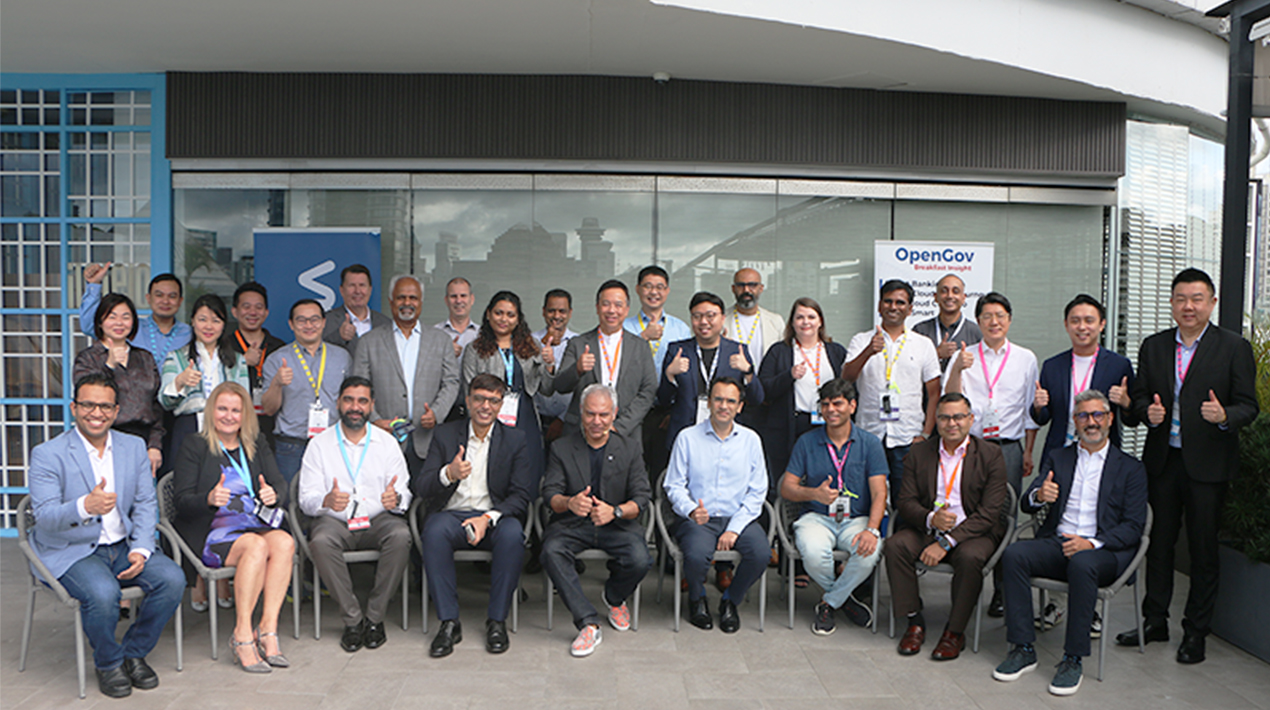
|
Getting your Trinity Audio player ready...
|
Over the past two years, a series of globally significant developments, including a plethora of critical events, has intensified the necessity for organisations to embrace reform, modernisation and innovation. Macroeconomic factors such as inflation, conflict, rising interest rates and disruptions in the supply chain have exerted pressure on organisations to explore innovative tech-enabled approaches.
Most notably, the pandemic has emphasised the criticality for organisations to establish flexible, scalable and collaborative structures, compelling them to reimagine their services with greater resourcefulness and ingenuity, while leveraging digital technology to bolster resilience against future disruptions.
In such a rapidly evolving landscape, adaptability, resilience, and the ability to generate novel ideas have become crucial determinants of an organisation’s success in navigating a dynamic environment. Successfully addressing these complexities is crucial for unlocking the full potential of their infrastructure and services.
Operational risk often stems from efforts to enhance the customer experience, but its impact can extend to financial resources, talent retention, and overall resilience in times of adversity. Lowering operating risk is essential for maintaining adequate capital levels, and this involves effectively managing the complexities that arise, meticulous tracking and mitigation issues that hamper inefficiencies or interruptions.
Organisations across the world leverage a diverse array of public, data centres and edge services to enhance their flexibility, cost control, data collection, and revenue generation from their services. To maximise the return on this investment, they face the challenges of managing disaggregated technologies, navigating increased compliance requirements, and adapting to ever-changing regulations.
Indeed, AI is playing a pivotal role in revolutionising the banking industry by enhancing the efficiency of various business tasks, particularly in customer service and customer experience. The integration of AI in these areas promises to bring about significant advancements, streamlining operations, ensuring security and providing tailored services that cater to individual customer needs.
As AI continues to evolve, its future applications in banking will expand to include risk management, fraud detection and investigation, policy compliance monitoring, and hyper-personalised customer experiences.
In implementing an intelligent cloud-based approach, maintaining resilience, safeguarding data, adhering to regulations, and preserving the flexibility to manipulate data in diverse ways are all critical factors. This method should be designed to facilitate automated updates, real-time synchronisation, and seamless operation within a digital ecosystem, ensuring that changes occur seamlessly, data remains current, and the system operates efficiently.
The OpenGov Breakfast Insight on 25 July 2023 at Voco Orchard Singapore highlighted the significance of cloud adoption in organisations and financial institutions, emphasising its role in enhancing security, performance efficiency and ultimately leading to increased customer satisfaction. Understanding how to establish a robust and adaptive framework, organisations can harness the full potential of the intelligent cloud while ensuring data security, compliance, and agility.
Opening Remarks

According to Mohit Sagar, the CEO and Editor-in-Chief of OpenGov Asia, the banking industry is currently experiencing a significant shift towards digitalisation, with cloud technology playing a crucial role in this transformation.
Cloud technology is revolutionising the banking sector, enabling financial institutions to enhance customer experiences, foster innovation, streamline processes, and maintain cost efficiency in the dynamic digital landscape.
“Leveraging the cloud, banks can effectively respond to evolving customer demands, upgrade their infrastructure, optimise their operations, and harness the benefits of adaptable and cost-efficient cloud services,” he observes. “This digital transformation empowers financial institutions to thrive in an ever-evolving digital world.”
By embracing cloud services, the banking industry gains newfound flexibility, improved cost management, enhanced data collection and analysis capabilities, revenue generation opportunities, and optimised performance through edge services. This enables banks to stay agile and competitive in an ever-evolving business landscape.
Capitalising on public, data centre and edge services empowers banks to adapt to market dynamics, reduce costs, extract valuable insights, and introduce innovative products and services. Cloud-based ecosystems facilitate collaboration, seamless integration with partners, and the creation of value-added offerings, propelling the banking industry forward with fresh ideas and opportunities for growth.
Cloud technology equips the banking industry with essential tools to enhance customer service and boost productivity. By harnessing the power of the cloud, banks can automate customer service processes, implement intelligent risk management systems, tailor their services to individual needs, and leverage flexible resources for rapid ideation and innovation. This enables banks to deliver efficient and personalised experiences while maintaining responsiveness in a rapidly changing market.
In addition to its existing benefits, the cloud holds immense potential for the future advancement of AI in the banking industry. This progress will enable banks to enhance their capabilities in fraud detection, automate regulatory compliance and leverage predictive analytics. By leveraging cloud technology, banks can proactively stay ahead in a rapidly evolving digital landscape, providing customers with cutting-edge services that meet their evolving needs.
“As banks embrace cloud technology, prioritising security and compliance becomes increasingly crucial.,” Mohit says. “Proactive security measures, access controls, and threat detection systems are vital to ensure regulatory guidelines are met and protect sensitive data.”
To maintain data privacy and ensure smooth operations, it is crucial to implement secure access management, develop incident response plans, and establish business continuity measures. Additionally, conducting regular security assessments, monitoring user access, and performing data backups in the cloud are essential for minimising risks and ensuring compliance in an ever-evolving cybersecurity landscape.
AI, ML, and NLP are revolutionary technologies that are transforming the banking industry by enhancing efficiency, elevating customer experiences, and fostering innovation. The integration of these technologies is reshaping traditional banking practices and propelling the industry forward.
These cutting-edge advancements enable banks to effectively detect and prevent fraud, manage risks, provide personalised banking services, conduct thorough risk assessments, ensure compliance, and unlock valuable insights through advanced data analytics.
AI, ML, and NLP tools enable banks to offer innovative and forward-looking banking services that align with evolving customer expectations and market trends. They pave the way for future possibilities such as AI-powered virtual advisors and predictive analytics. By leveraging these tools, financial institutions can cater to the needs of the next generation and maintain a competitive edge in the market.
To effectively harness the benefits of cloud technology, financial institutions must adopt a “cloud-smart” strategy, Mohit advises. This strategy entails evaluating workloads and requirements, selecting appropriate cloud migration approaches, integrating hybrid cloud environments, implementing cloud-native development practices, rationalising costs, ensuring governance and establishing robust processes for continuous monitoring and optimisation.
By adhering to these principles, financial institutions can maximise the potential of cloud technology,” Mohit believes. “They can ensure efficient operations, control, security, cost-effectiveness, compliance and adherence to best practices in a dynamic and evolving cloud landscape.”
Welcome Address

A typical customer journey in the world of cloud technology frequently starts with a state of chaos and confusion but gradually develops into a state of clarity and strategic implementation, says Hanish Arora, Senior Director – Enterprise and Application and Cloud Transformation, ASEAN and Korea, VMware. It is possible to think of this evolution as going from “Cloud Chaos” to “Cloud Smart”.
The enormous selection of cloud options on the market initially overwhelms many firms, according to Hanish. Organisations may struggle with a variety of issues like poor visibility, security worries, and ineffective resource allocation. Their capacity to realise the full promise of cloud technology may be hampered during this chaotic phase.
However, enterprises begin to navigate the cloud ecosystem more skillfully as they gather knowledge and experience. They start to act with greater strategy and consideration, becoming “Cloud Smart.” This calls for optimising resource allocation, putting in place strong security measures, and coordinating cloud solutions with specific business goals.
Hanish stressed that to become cloud-smart, businesses must use cloud services that fit their particular needs and objectives. They create distinct governance and security structures, guaranteeing data protection and adherence to compliance requirements. They take advantage of cloud infrastructure’s scalability and flexibility to promote innovation, boost operational effectiveness, and provide improved consumer experiences.
In addition to putting cost reduction first, “Cloud Smart” organisations also focus on maximising the return on cloud investments. To maintain optimal performance and affordability, they regularly analyse and optimise their cloud infrastructures, says Hanish.
In the end, the transition from “Cloud Chaos” to “Cloud Smart” symbolises a transformational path where businesses fully utilise cloud technology. Organisations may overcome obstacles, seize new possibilities, and produce measurable business outcomes in the cloud era by adopting a planned and intentional approach.
Hanish observes that enterprises are continuously looking for ways to fully utilise cloud technology in the quickly changing digital landscape of today. However, making the switch from traditional infrastructure to the cloud may frequently be a difficult and complicated process, resulting in “Cloud Chaos.” This is where VMware comes into play, providing businesses with a direct route from Cloud Chaos to Cloud Smart with its extensive suite of Cross-Cloud Services.
“VMware is aware of the difficulties that businesses encounter when navigating the cloud environment. That’s why it offers a unified platform that makes it easier to manage and run multi-cloud settings with its Cross-Cloud Services,” Hanish reveals. “Organisations can improve control and visibility over their cloud deployments by providing a uniform infrastructure across private, public, and hybrid clouds.”
Managing workloads seamlessly across various cloud providers is one of the main advantages of VMware’s Cross-Cloud Services. This gives businesses the freedom to select the best cloud for each workload depending on criteria like performance, pricing, and compliance.
VMware enables businesses to optimise their cloud strategy and steer clear of the traps of Cloud Chaos by removing vendor lock-in and offering a standardised approach. Additionally, sophisticated security measures are provided by VMware’s Cross-Cloud Services to safeguard data and applications in the cloud.
Organisations are guaranteed that their cloud environments are secure and compatible with industry laws by implementing built-in security controls and policies. This improves data security and reduces possible dangers, enabling businesses to embrace the cloud with confidence.
Additionally, VMware’s Cross-Cloud Services help businesses improve productivity by streamlining operations. Organisations can update and expedite the deployment of apps and services via the use of automation and orchestration capabilities.
“This enables quicker time-to-market and improved operational efficiency, contributing to the transition from Cloud Chaos to Cloud Smart,” he concludes.
Power Talk: From Complexity to Simplicity: The Journey from Cloud Chaos to Cloud Smart

Varun Mittal, Head of Innovation and Ecosystems at Singlife, shared his insights on the latest trends in the financial industry, highlighting the crucial role of innovation and collaboration in addressing the complex and dynamic challenges present in today’s banking world.
The digital era has transformed the way people engage with banking services, setting higher expectations for efficiency, convenience, and customer experience. Against this backdrop, the intelligent utilisation of cloud technologies to drive successful transformation cannot be underestimated.
Drawing from Singlife’s experience, Varun Mittal revealed that their transition from the initial challenges of cloud deployments to a well-structured and integrated approach has resulted in substantial benefits for their organisation.
Srinivas Patil, Chief Technology Officer at Trust Bank, added his perspective, leaning on his vast experience in managing technology infrastructure and spearheading digital transformation in the banking industry. He reiterated the criticality of embracing a smart cloud approach to effectively address the challenges confronting the banking sector today.
Smart cloud goes beyond the mere adoption of cloud technology, he believes. It encompasses a strategic approach to managing digital assets and harnessing data to enhance operational efficiency and deliver a superior customer experience. This comprehensive and intelligent use of cloud resources empowers organisations to stay agile, innovative, and customer-centric in the ever-evolving landscape of the banking industry.
Indeed, a successful bank is one that effectively integrates artificial intelligence (AI), advanced analytics, and dependable cloud technology to gain a competitive edge in a highly competitive market. This potent combination empowers banks to make data-driven decisions, enhance customer experiences, optimise operations, and stay ahead of the competition.

Srinivas emphasised the paramount importance of data security and privacy in the context of the smart cloud approach. He delved into the strategies required to uphold the reliability and integrity of customer data while ensuring strict compliance with privacy regulations.
Recognising the critical nature of safeguarding sensitive information, these measures are vital for building trust with customers and maintaining the bank’s reputation in an increasingly digital and data-driven banking landscape.
“In the digital era, establishing and maintaining customer trust through robust data protection measures is the key to gaining a competitive advantage,” Srinivas is convinced. “Ensuring the security and privacy of their data becomes a cornerstone of building lasting relationships and attracting new customers.”
Providing his perspective as someone working directly in the banking industry, Srivatsan Pillai, Executive Director, Architecture, Engineering & DX – Retail, Wealth & Wholesale Banking at UOB Bank, underscores the significance of data protection and risk mitigation in today’s digitally connected banking environment.
Making digital security a top priority is crucial in any smart cloud-oriented banking strategy. The significance of implementing advanced security technologies, including robust encryption, data protection measures, and stringent monitoring mechanisms to safeguard the integrity and confidentiality of customer information cannot be underestimated.
Additionally, organisations must not diminish the importance of educating and raising awareness among employees regarding digital security threats. This empowers them to become the frontline defence against cyber-attacks and protect banking assets effectively.

Srivatsan also stressed the significance of regulations and compliance concerning digital security in the banking industry. He highlighted the importance of adhering to industry standards, government regulations, and relevant security frameworks.
To create a safe and dependable ecosystem for customers, he believes there is a need for close collaboration between banking institutions, regulators and security partners. This cooperative approach ensures that banks meet the necessary requirements and provide customers with a secure and trustworthy banking experience.
Joely Scott-Thomas, Senior Director – Banking and Financial Services Practice, Asia Pacific and Japan at VMware elaborated on the criticality of adopting innovative technologies, such as virtualisation and managing software-defined infrastructure, in achieving competitive advantage.
Embracing new technologies provides businesses with a competitive edge by enabling the offering of unique products or services, enhancing efficiency, and reducing costs. Additionally, innovative tools and processes streamline operations, boost productivity, and optimise resource allocation, resulting in higher output and increased profitability.
Technology enables tailored services, easy access to finance, and a seamless customer experience, while advanced data analytics plays a crucial role in gaining valuable insights into customer preferences and needs.

“Innovative technologies enhance customer interactions, personalisation and convenience, resulting in higher customer satisfaction and loyalty,” Joely says. “Advanced analytics and AI-driven technologies offer valuable insights, facilitating data-driven decision-making and strategic planning.”
Christopher J Tan, Global Partner Revenue, Acceleration Director at APJ Intel, spoke about the critical role of Intel technology in propelling speed, performance, and innovation within the banking sector.
Cutting-edge technologies, such as high-level data processing, artificial intelligence (AI), and advanced security, play a pivotal role in enabling banking organisations to meet the ever-evolving demands of market competition and customers.
In this context, collaboration with technology partners is paramount to achieving success in digital transformation. Robust and mutually beneficial partnerships with technology providers, such as Intel, can help tackle complex challenges and develop innovative solutions that cater to the future needs of the banking industry.

He highlighted the significance of sustainability in banking digital transformation and elaborated on how Intel technologies can play a critical role in developing environmentally friendly and energy-efficient solutions.
These solutions help banking organisations minimise their environmental impact and work towards achieving their sustainability goals.
Christopher encouraged the participants to persist in their innovation efforts and embrace cutting-edge technologies, particularly those provided by Intel, to navigate the fast-paced changes in the banking sector.
He underlined the significance of maintaining a swift pace of adaptation, integrating innovation with a robust strategy, and continuously learning from experiences and industry insights to gain a competitive advantage.
“Intel’s tech fuels drive speed, innovation, and performance in banking,” Christopher ends. “We help companies navigate the complexities of digitalisation and gain a competitive advantage.”
Closing Remarks
Guru Venkatachalam, Vice President and Chief Technology Officer for Asia Pacific and Japan at VMware commended the attendees for their valuable contributions and the time they dedicated to sharing their knowledge, recognising the immense value it would bring to others as a valuable learning experience.

Achieving a “Cloud Smart” organisation involves leveraging cloud services that align with its specific needs and objectives. Leveraging the flexible and scalable nature of the cloud empowers organisations to drive innovation, improve operational efficiency, and provide exceptional customer experiences. He highlighted the importance of implementing strong control and security frameworks to ensure data protection and regulatory compliance.
“VMware’s Cross-Cloud Services give organisations the tools and skills they need to deal with the complexity of the cloud environment and move from Cloud Chaos to Cloud Smart,” Guru says.
VMware helps organisations use the full potential of cloud technology and drive digital change by giving them a unified platform, better security, and streamlined operations. It is an important part of businesses’ cloud strategies because it offers a wide range of solutions and services that are made to fit their needs.
With VMware’s full set of solutions and services, companies can come up with and implement a successful cloud strategy. It enables organisations to use the full potential of the cloud and drive digital transformation by giving them multi-cloud management, migration assistance, security, hybrid cloud integration, and automation tools.
Mohit stressed the significance of technological collaborations as a means to access specialised knowledge and expertise that may not be readily available within the organisation. Collaborating with external partners allows businesses to tap into valuable resources and leverage diverse competencies, enabling them to overcome limitations and drive innovation more effectively.
“Partnering with technology companies allows businesses to tap into the skills and experience of their partners, gaining insights and guidance on implementing the latest technologies and best practices,” he reiterates.
Working relationships with technology partners promote innovation by bringing together diverse perspectives and ideas. Businesses can gain access to cutting-edge technologies, research, and development capabilities through partnerships, accelerating their innovation cycles and bringing new goods and services to market faster.
Technological alliances help organisations stay ahead of the competition by combining complementary strengths. Partners can offer holistic solutions that exceed solo offers by integrating resources, technologies, and market knowledge, generating a unique value proposition for customers.
These partnerships provide firms with several benefits, such as access to expertise, enhanced innovation, extended resources, market advantages, risk reduction, faster time-to-market, and competitive advantage.
“By collaborating with technology partners, businesses can drive growth, increase efficiency, and unlock new opportunities in the dynamic and rapidly evolving technological landscape,” Mohit concludes.
















